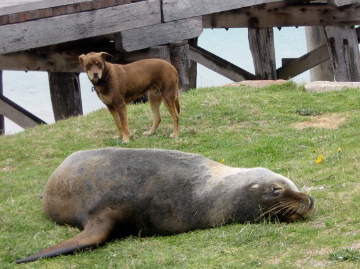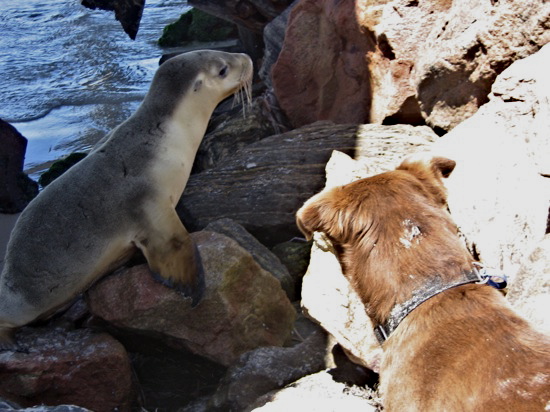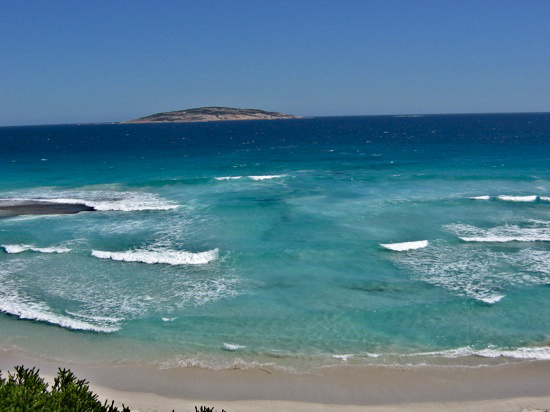   Cheryl’s newest photos from Esperance, Australia: Marlo checks out a sleeping sea lion, and later a sea lion baby, on this magnificent beach Since I missed posting links last week, there’s a bumper crop this week Also, I’m behind in my blogroll scan, so these are mostly links from subscribed sources and diligent readers. Back to the regular round-up next week. Things I Learned in 2008: PS Pirro and Communicatrix have wonderful year-end lists. Here is mine, undoubtedly incomplete, and in no particular order:
Knowing What You’ve Lost: One of Patti Digh’s finest essays is one she wrote three years ago about the death of her father, who was born on Christmas Day and died at age 53. My mother died on Christmas Day 1988, at age 60. Will We Act to Prevent Great Depression II?: Paul Krugman is doubtful. And there have, of course, been many great depressions before the one in the 1930s, back before the memory of potato famines and cannibalism. But still we believe, against all the evidence surrounding us, that it can’t happen again. How to Fix the Financial System: A 3-part NYT article suggests sober, long-term ideas for repairing the broken financial system that make a lot more sense than bailouts. They include nationalization (which is, of course, politically unacceptable) and instead of trying to perpetuate and restart the insane borrow-more-spend-more cycle, recommend a more resilient restructuring that will let the markets self-correct for the excesses (also politically unacceptable, because the rich, the incompetent executives and the over-extended and reckless investors will take the hit, instead of the taxpayer). Good link in this article to the cause of the Madoff scandal as well — basically laying the fault on the regulators. The City Hurts Your Brain: I’ve often said that I hate cities, and that as I get older and more aware of myself I am convinced that cities make me ill — stressed, sad, pessimistic, disengaged, disconnected. Now research confirms that cities are not good for us: “Just being in an urban environment…impairs our basic mental processes. After spending a few minutes on a crowded city street, the brain is less able to hold things in memory, and suffers from reduced self-control…People who had walked through the city were in a worse mood and scored significantly lower on a test of attention and working memory.” Thanks to Tree for the link, and the one that follows. The Mother of Twin Oaks: Kat Kinkade, who died last year, was the founder of Twin Oaks, one of the most successful and enduring intentional communities in the US. Her moving NYT obituary tells you something about the idealism that lies behind intentional communities, and some of the challenges they face. Our Vulnerable Food System: Wes Jackson and Wendell Berry explain that the industrial agriculture system, which has exhausted and exposed soils, made crops dependent on massive use of oil-based fertilizer, pesticides and herbicides, increased vulnerability to drought, storms and disease, poisoned the soils, and replaced permaculture with fragile monoculture, is utterly unsustainable and (just as thge excesses of the financial system led to its collapse) headed for collapse, perhaps (as I’ve reported before) as early as this year. Our willingness to shrug off these dangers until collapse actually occurs does not bode well for our ability to cope with the cascading crises ahead of us. Information for the Polyamorous and Those Who Love Them: I recently discovered two useful articles on this subject. Advice for someone monogamous in love with someone polyamorous. (“Especially if your partner isn’t currently involved in other relationships, it’s tempting to believe that it won’t come up–that your partner might be polyamorous in some abstract sense, but if your relationship is good enough, you’ll never have to deal with the reality of seeing your partner want somebody else. Avoid this temptation; this isn’t something you’re likely to be able to make go away.”) And How to practice polyamory. (“Learn to manage your time.”) What You Don’t Know About Gaza: Some facts about the world’s largest refugee camp. …and About Afghanistan: In the failed state of Afghanistan, everything is for sale — drugs, political office, justice, and, of course “protection”. “Kept afloat by billions of dollars in American and other foreign aid, the government of Afghanistan is shot through with corruption and graft. From the lowliest traffic policeman to the family of President Hamid Karzai himself, the state built on the ruins of the Taliban government seven years ago now often seems to exist for little more than the enrichment of those who run it.” The continued involvement of our soldiers to bolster this state of bribery and corruption run amok is insane. Yet Another Eco-Holocaust: The damage from the massive toxic ash spill from the TVA’s Kingston coal-fired power plant will eclipse that of the Exxon Valdez spill. There is abundant evidence of negligence, lax regulation (the site has a chronic history of spills and other environmental and safety failures), and incompetence. When will we learn that big corporations will never regulate themselves, and care about nothing but the next fiscal quarter’s profits? As long as corporations are designed to be psychopathic (see the following item), our failure to regulate them, police them, punish them for misdeeds, and jail their leaders when they misbehave, is nothing short of madness. Thanks to Graham Clark for the links. Online: Joel Bakan’s The Corporation: This exceptional film on the inherent psychopathy of corporations, based on the book, is now online in multiple parts. Here’s a summary of the best clips from the film to whet your appetite. Thanks to Andrew Campbell for the link, and the one that follows. Not an Economic Collapse, a Renaissance: Architect Christopher Travis argues that instead of worrying about and rescuing the industrial economy, we should be bringing into existence a new economy, “a system of exchange and value that recognizes our interdependence, that is endlessly and systemically innovative, an economy of infinite possibility, of sufficiency, an economy that works for everyone.” Reforming the Hopelessly Broken US Health System: Tom Daschle has the most difficult job in the world. To make the US health system affordable and accessible will mean ending the two-tier structure that gives the rich the best health care money can buy, and gives US doctors salaries that only the rich can afford. It will also mean acknowledging that the private sector is simply incompetent to manage an effective health care system, and needs to be fired — an unimaginable heresy in a nation that loves to hate government and worships the ‘free market’. Interactive NASA Climate Change Maps: Picture the potential devastation of climate change. Thanks to Craig De Ruisseau for the link. Thoughts for the Week:
The Want Bone
The tongue of the waves tolled in the earth’s bell. The bone tasted of nothing and smelled of nothing, Ossified cords held the corners together The beach scrubbed and etched and pickled it clean. |





Gaza isn’t a refugee camp, it’s a Ghetto, and, the Jewish Zionists are practicing genocide.http://video.google.com/videoplay?docid=-2451908450811690589&hl=enhttp://www.iht.com/articles/2009/01/08/opinion/edkhalidi.php
That is a fine end-o’-year list, Mr. Pollard. All this loosening up and getting your art on has been good for you!
lurked for a while, my first comment. Love your list, moving, makes me a little tearful in fact ;) Thanks
This 2008 list sounds as if you’ve just became…adult!j/k “Discovering where we belong and what we’re meant to do gets more difficult as the world becomes more complex and interconnected”: that’s for sure, cause with overpopulation, cities that are bad for our brains becomes larger, and places where we belonged becomes exctinct (mine was even before I was born anyway).About market economy loosing value nowadays, I disagree: I guess it’s an eye awakening opportunity for some people to let go of the money race. Becoming more frugal, growing to be more autonomous, self reliant, and reinventing barting systems and ‘gift economy’, in order to replace the lost market value. Once people taste the pleasure of free time, they won’t exchange it against a little money. This experience has been done on the whole french people, few years ago ’35 hour week’ replaced a 39 jour work week. But last year due to sluggish french economic growth the government tried to make people work longer hours for extra money, but most refused…they had tasted freedom and would not trade it for few bucks!people ain’t so stupid, u know!
On the econ (too little too late) and ag (old admonishments that go nowhere).Lovely stuff on Kat and Twin Oaks. Too bad she can’t do it over again with all she learned.Done being glued to the disaster news, too. Time to focus more and more on what makes sense.